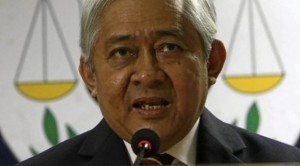A first: SolGen asks SC to bar Chief Justice from voting
MANILA, Philippines–In an unprecedented move, the government’s chief lawyer, a leading nominee for the last seat in the Supreme Court, is asking the help of the high tribunal in stopping Chief Justice Ma. Lourdes Sereno from taking part in the voting to be conducted by the Judicial and Bar Council (JBC) on the nominees on June 30.
It was the first time that a Solicitor General is raising the appeal against a Chief Justice before her peers, some of whom were earlier reported to be not too pleased about her appointment to the top post two years ago.
In a letter addressed to the high court on Wednesday, Solicitor General Francis Jardeleza said Sereno had violated his right to due process by not informing him beforehand and not asking him to refute her objections to his integrity as a nominee in accordance with JBC rules and regulations.
Jardeleza is among 13 nominees for the position of associate justice vacated by Roberto Abad, who retired on May 22. Sereno is the ex-officio chair of the six-member JBC.
Jardeleza had faced the JBC four times as a nominee since 2010. He was nominated once for the position of Deputy Ombudsman for Luzon; twice for associate member of the Supreme Court; and once for Chief Justice, which eventually went to Sereno.
Article continues after this advertisementNot in good terms
Article continues after this advertisementA source privy to the backgrounds of both Sereno and Jardeleza, who asked not to be named, said the pair had not been in good terms since the days when they were faculty members of the University of the Philippines College of Law.
In his letter, Jardeleza said he was informed recently by a JBC member, Associate Justice Aurora Lagman of the Court of Appeals, that he was being asked by the JBC to appear before it on June 30.
Jardeleza was also told that during the JBC meetings on June 5 and 16, Sereno invoked a provision of the JBC rules against him, Section 2 of Rule 10, which stipulated the required votes “when integrity of a qualified applicant is challenged.”
Abuse of discretion
Lagman also told Jardeleza that Sereno would inform him of her objections to his integrity at the June 30 meeting.
Because of this, Jardeleza said Sereno’s actions and omissions violated his right to due process and the council’s rules, and constituted grave abuse of discretion.
“I therefore humbly seek the intervention of the Honorable Supreme Court en banc to exercise its power of supervision over the Council (Section 8, Article VII of the Constitution),” Jardeleza said.
He said the accusations against his integrity were made twice, “ex parte, without informing [him] of the nature and cause of the accusations against [him], and without giving [him] an opportunity to be heard.”
Due process steps
The Solicitor General said JBC rules had been violated, particularly Section 2 of Rule 10, as this “does not grant a member of the council’s peremptory powers to deny an applicant a nomination, in the absence of evidence priorly brought to the attention of, and validated by, the council in the public and transparent process prescribed in its rules.”
“Plainly, while a Section 2, Rule 10 of JBC-009 challenge can be made by a council member at the time of the voting, the same can only be done after several due process steps have been satisfied,” Jardeleza said.
According to him, a JBC member may only invoke this provision when the council meets in executive session for final deliberations and after conducting public interviews that included asking a nominee to explain any opposition against him.
“With due respect, the Chief Justice neither supervises my work nor my public or private life. Any information she may have on work or my life that may relate to my integrity can thus only come from secondhand third parties,” he said.
Right to defend self
Jardeleza said what Sereno should have done was to advise the informants to execute sworn opposition to his nomination or to conduct a discreet investigation of the information. But the JBC should also inform him and give him the right to defend himself and cross-examine the witnesses.
Without the high court’s intervention, Jardeleza said he would suffer “irreparable injury” to his nomination and to his name and integrity, stressing that he has “built his life in the law based on integrity.”
Jardeleza appealed that the Supreme Court issue an order:
— Directing the council to give him at least five working days written notice of any hearing to which he will be summoned, and the notice to contain the sworn specifications of the charges against him by his objector, the sworn statements of supporting witnesses, if any, and copies of documents in support of the charges.
— Making notice and sworn statements part of the public record of the council.
— Allowing him to cross-examine his objector and supporting witnesses, if any, and the cross-examination to be conducted in public, under the same conditions that attended the public interviews held for all applicants.
— Directing the council to reset the June 30 meeting to another date not earlier than July 10 and to disallow Sereno from participating in the voting.
RELATED STORY
